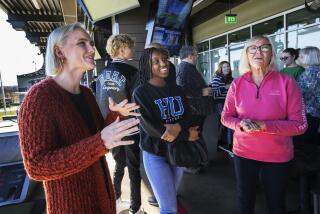CIA JITTERS: The summer of 1991 has...
- Share via
CIA JITTERS: The summer of 1991 has become a season of anxiety for officials of the Central Intelligence Agency.
Concerns first centered around the still-unfinished business of the Iran-Contra scandal, as independent counsel Lawrence E. Walsh focused increasing amounts of energy on the activities of former high-ranking CIA officials and as questions about Robert M. Gates’ involvement in the affair stalled his nomination to head the agency.
More recently, however, the BCCI scandal has contributed to the nervousness. At first, agency officials thought they were clear of trouble after a preliminary report by the agency’s inspector general concluded that although CIA funds had been deposited in the Bank of Credit & Commerce International, all of them had been handled properly.
But members of the congressional intelligence committees have challenged that finding, questioning whether the CIA acted quickly enough to get its money out of the bank once the bank’s problems became apparent. Moreover, investigators continue to examine whether the CIA failed to properly alert government regulators once intelligence officials became aware of BCCI’s questionable activities.
Meanwhile, on the Iran-Contra front, former CIA officials have created a defense fund to help pay the legal bills of current and former agency employees. The agency itself has no role in the fund, which is being run by five former high-ranking CIA officials.
BCCI’S BELTWAY BRANCH: Some of the most tantalizing questions arising from the BCCI scandal involve the office that the bank once maintained in Washington to represent its interests before government officials.
“If there is abusive behavior in the U.S., it’s likely to be through that office,” said a source closely involved in one BCCI investigation.
The Federal Reserve is pressing the Justice Department to subpoena the records of the office, which was closed months ago. But the source concedes: “We don’t know to what extent they (the records) exist.”
In part, attention is being focused on the Washington operation because investigators have yet to uncover much in the way of criminal activity inside the U.S. banks that were under BCCI’s control, such as Washington’s First American Bank. So far, the worldwide web of corruption linked to BCCI appears to stop at U.S. shores.
MUZZLING CUSTOMS: In another example of a growing intergovernmental feud over the handling of the BCCI debacle, the Treasury Department has issued what U.S. Customs Service officials describe as a hush order to Customs agents in the field.
The directive bars the agents from talking to reporters about the BCCI case unless the conversations are monitored--and tape-recorded--by an agency public affairs officer, according to agents familiar with the order.
A Treasury spokeswoman insists that nothing has changed. Listening in on interviews, she says, is a standard precaution. But other sources say the new rules were ordered up by Treasury headquarters in Washington just hours after former Customs chief William von Raab publicly excoriated the department and other federal agencies for their slowness in pursuing the case.
The Customs office in Tampa, Fla., launched the first U.S. probe of BCCI in 1988. But the federal investigation was inexplicably stalled, infuriating Von Raab and Customs subordinates who hold that Treasury is largely to blame.
More to Read
Sign up for Essential California
The most important California stories and recommendations in your inbox every morning.
You may occasionally receive promotional content from the Los Angeles Times.













